How the Iraq war followed one veteran home
- Published
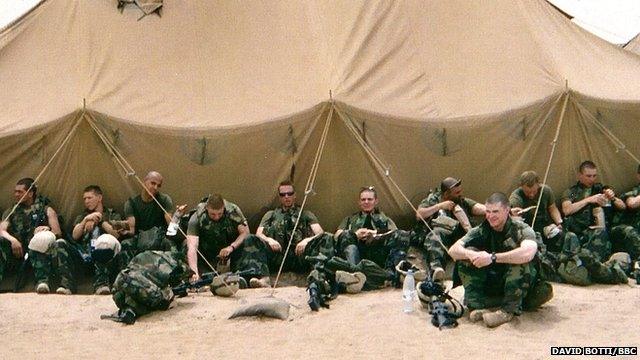
Members of the author's infantry platoon wait in Kuwait for transport into Iraq
As the last US troops leave Iraq, the BBC's David Botti reflects on the nearly nine years of war. He served in Iraq as an infantryman in the US Marine Corps Reserve during the 2003 invasion. After he came home the war remained a presence in ways he couldn't have imagined.
One morning in late-2003 I sat in my bedroom watching the news on my computer. A suicide bomber had detonated his vehicle at an Italian military building in southern Iraq - there were more than 20 people dead, both Italians and Iraqis.
This building, in the city of Nasiriya, was the headquarters of my own Marine platoon just a few months before. The exterior walls of my former bedroom were blown off and rubble was piled on the exact spot where I'd slept.
My platoon suffered no casualties on our deployment. Now it felt as though we'd had our first casualty and we weren't even there. This was a building that housed every memory of our wartime experience and it was nearly gone. The fate of Iraqis I'd remembered from the neighbourhood was unknown.
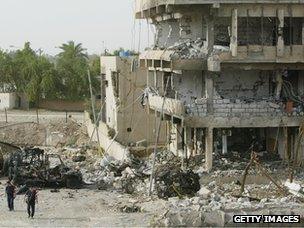
The author's former headquarters in Iraq was struck by a suicide bomb in November 2003
I couldn't understand what was happening. I had just woken up. I was in New York City watching the news and eating breakfast. My former home was now an early example of the burgeoning insurgency movement in Iraq.
And so began a pattern repeated for years to come - life gets interrupted and the home front suddenly doesn't seem so calm.
Violence changes people and it changes nations, but so does time. When I look back on Iraq I look at it as a long war - one that continued to resurface through every phase of my formative 20s.
Since my infantry company came home from Iraq in August 2003 I have moved seven times, worked at least 10 jobs of varying types, attended graduate school, returned to Iraq as a journalist five years after leaving, and seen the Arab Spring unfolding before my eyes.
But Iraq has been a constant presence.
Reunions
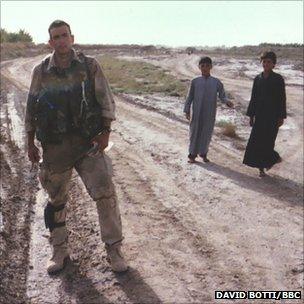
The BBC's David Botti served as a Marine in Iraq in 2003
Well before I had any desire to become a journalist I once found myself taking a series of interviews whose answers I still revisit.
I was 22 years old, sitting in the southern Iraqi desert. This was April 2003 and my infantry company had arrived at the tail-end of the invasion force.
I started asking other Marines questions and recorded their answers in my journal. One I asked was how the Marines would look back on the war in 40 years.
"[That] it characterised the youth of my life," one guy said. "It formed the foundation for the rest of my life."
The answer made sense even if it was a bit obvious. Of course it would define our youth. What I didn't know is that the war would do so in ways I never considered.
The military can also be a transitional kind of beast - soldiers and Marines transfer among units, volunteer for deployments and you never see them again.
Almost a year after the Nasiriya bombing, my phone rang as I got ready for bed. I was told Sergeant Uvanni, who was in our unit before the war, had been shot through the armpit and killed in Samarra.
Days later I drove four hours to the funeral, my first military funeral, and paid my respects at his casket beside other Marines who'd also known Sgt Uvanni back in peace time.
This became the only way many of us from the war's early days saw each other over the years - these reunions standing outside churches and watching caskets carried past.
Sgt Uvanni, a man who I would've all but forgotten, was suddenly transformed into a person I would never forget. There were more like him to come.
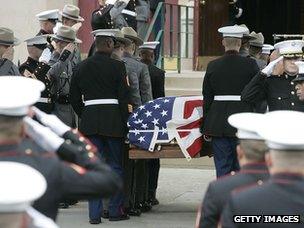
Capt John J McKenna IV was killed in Fallujah while trying to rescue a mortally wounded comrade
There was the email forwarded to me in 2005, as I sat working in my office, announcing that Lance Corporal Tremblay was killed by a roadside bomb. He'd been in my unit too at one point - another face I had easily forgotten.
In 2006 I was working a freelance job in Pennsylvania during the Little League World Series when I got a call that two Marines from my old unit had just been killed.
Captain McKenna was shot by a sniper in Fallujah as he tried to drag a mortally wounded L/Cpl Glover to safety. I told my supervisor I had to go to two funerals (nothing more), and took a bus back to New York.
Closure
For those of us who came home in 2003's first wave of veterans it felt as though we were anomalies - a curiosity.
Growing up combat veterans always seemed middle-aged or elderly, they were almost always men. It had been decades since young war veterans flooded back into schools and jobs, or into the government's care.
But as the war went on I came across more and more veterans in my daily life - it seems now everyone knows someone who's served in Iraq or Afghanistan.
This has been a long war. The country has adjusted, however sad it is to say, to what living during wartime feels like. And time sometimes has an unexpected way of bringing a bit of closure.
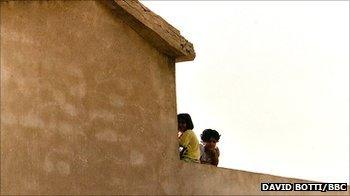
Early in the Iraq war marines in Nasiriya lived close to neighbourhood residents
In 2008 I returned to Iraq as a journalist for Newsweek, and sitting in the back of an armoured vehicle I met a soldier who'd fought in Samarra. I was astonished to learn he'd spent time living out of a base called "Camp Uvanni" - named in memory of the soldier whose funeral was the first I attended.
Now through emails and Facebook pages honouring Capt McKenna and L/Cpl Glover I can see numerous memorial charities and events constantly held in their honour.
And as I type this sitting in our Washington bureau, working across the office from me is BBC correspondent Paul Adams, who covered the bombing, external at my former base in Nasiriya.
After nearly nine years, I've finally met someone who was there that day - the day the war first reared itself into my civilian life.
He tells me, I'm happy to say, that he can confirm at least one of the families I remembered from that neighbourhood did indeed survive the attack.